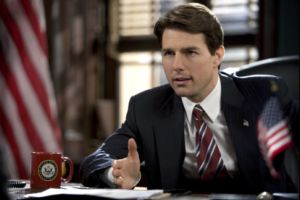Mark:
Intelligent, thoughtful dramas don’t come too often from Hollywood filmmakers seemingly obsessed with box office riches and the next big thing – and they usually don’t star Tom Cruise. The last two to three years, however, have brought several surprisingly considered screenplays, and to that list can now be added Lions for Lambs.
Career journalist Janine Roth (Meryl Streep), who once labelled Senator Jasper Irving (Tom Cruise) the future of his party and likely president, is called to his office and is surprised to hear she will be given the scoop on a new tactic for the war on terror. At the frontline, attempting to claim a ‘forward operating point’ that will allow strategic control over an area of Afghanistan, are Arian (Derek Luke) and Ernest (Michael Peña), two idealistic young soldiers who once studied under Professor Stephen Malley (Robert Redford), who is desperate to engage the mind of a lazy but potentially great student, using the example of his heroic former students.
 Lions for Lambs features a dialogue-heavy screenplay that may tax even the most attentive of viewers, but its rewards are worth the effort. The only criticism it allows is that while it outlines a lot of the perceived problems with the US approach to foreign policy since 9/11, it never really commits to a single point of view. Rather, Lions for Lambs includes characters presenting arguments for and against the wars in Iraq and Afghanistan, as well as criticism of a press too eager to report what they’re told rather than think for themselves, and an exploration of the political and social disinterest of ‘Generation Why?’. The script eloquently positions characters on either side of a debate, and has the courage to let them just sit and talk it through. The only of the three subplots that isn’t purely the conversation between two opposing people – that of the fallen soldiers in the Afghani mountains – is also the least interesting for that reason. The soldiers’ story is, however, the most dramatic of the three, and the most likely to appeal to an audience possibly expecting a more prototypical war drama.
Lions for Lambs features a dialogue-heavy screenplay that may tax even the most attentive of viewers, but its rewards are worth the effort. The only criticism it allows is that while it outlines a lot of the perceived problems with the US approach to foreign policy since 9/11, it never really commits to a single point of view. Rather, Lions for Lambs includes characters presenting arguments for and against the wars in Iraq and Afghanistan, as well as criticism of a press too eager to report what they’re told rather than think for themselves, and an exploration of the political and social disinterest of ‘Generation Why?’. The script eloquently positions characters on either side of a debate, and has the courage to let them just sit and talk it through. The only of the three subplots that isn’t purely the conversation between two opposing people – that of the fallen soldiers in the Afghani mountains – is also the least interesting for that reason. The soldiers’ story is, however, the most dramatic of the three, and the most likely to appeal to an audience possibly expecting a more prototypical war drama.
The four conversational roles are all exceptionally well performed – never has Tom Cruise seemed so comfortable in a performance. His Senator Irving is calculating and slippery, and yet carries the Cruise charm that allows him to almost convince you his way is the right way. Streep handles the earlier portion of her part with dexterity, but perhaps slips slightly during the ‘crisis of confidence’ component, and Redford seems completely at ease in his turn as the idealistic professor. Andrew Garfield is convincing as his future protegé, and is just ambivalent enough to believe he really could waste his obvious talent.
The interweaving of the three subplots is confident and is accompanied by real tension as the discussions about the meaning and value of self-sacrifice are given life in the form of Arian and Ernest. The final outcomes may not be surprising, however the ideas raised throughout the story may well turn over in the mind long after the credits. While it isn’t perfect, the value of discussion about why we do as we do is high enough that flaws can be forgiven. It’s only a shame that a film such as this, so full of thought and offering many different viewpoints while allowing the audience to decide for themselves, is too easily written off as ‘more left-wing Hollywood propaganda’ by those challenged by the exploration of ideas.
Rating: